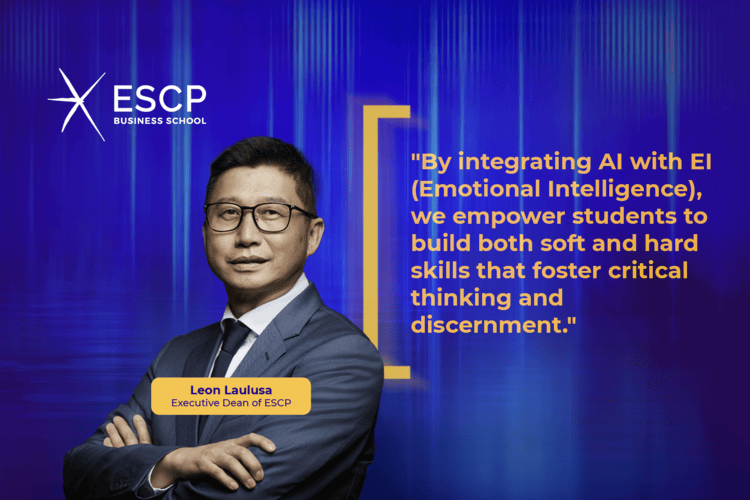The Rise of Emotionally Intelligent AI: Bridging the Human-Machine Gap
Artificial intelligence (AI) is advancing at a pace that few could have predicted, upending industries and shaping the future of work. In 2024, 72% of organisations integrated AI into at least one business function, up from 55% in the previous year. With the rapid evolution of AI, time and again, experts have pointed to one skill that remains uniquely human: emotional intelligence (EQ)—the ability to recognise, understand, and manage emotions.
But increasingly, these two forms of intelligence are intersecting in ways that challenge our understanding of human-AI collaboration. What does this mean for the future of leadership, decision-making, and the workplace? In this context, ESCP Business School is equipping future leaders with the skills to balance technological acumen with irreplaceable human insight in an AI-driven world.
Artificial Intelligence: Beyond Logic, Toward Creativity and Emotion
In recent years, artificial intelligence has drawn increasing attention for its ability to improve productivity, automate processes, and drive innovation. Traditionally, AI was seen as a tool for logic-driven, data-based decision-making, handling structured tasks faster and more accurately than humans. However, it is now expanding into areas once thought to require uniquely human traits—such as creativity, empathy, and emotional intelligence.
In embracing GenAI, we also emphasize the future-proof skills essential for ethical and responsible AI use. By integrating AI with EI (Emotional Intelligence), we empower students to build both soft and hard skills that foster critical thinking and discernment.
 Léon Laulusa
Léon LaulusaDean and Executive President of ESCP Business School
Understanding Emotional Intelligence and Its Role in Connection
Popularised by psychologist Daniel Goleman, EQ is the ability to recognise, understand, and manage one’s own emotions while navigating those of others. Goleman highlighted EQ’s role in leadership, conflict resolution, and empathy-driven decision-making, emphasising its relevance across settings—from corporate boardrooms to family dinners.
High levels of EQ lead to better communication, stronger mental health, and improved collaboration with team members, even bridging generational gaps. As workplaces become increasingly global and diverse, EQ also overlaps with cultural intelligence, reinforcing our ability to connect and adapt to different social norms and emotional contexts.
How Does AI Intersect with Emotions?
AI is quickly evolving to recognise and respond to human emotions with increased efficiency—a field known as affective computing. By leveraging machine learning (ML), AI can:
- Analyse facial expressions to detect emotions like happiness, frustration, or surprise.
- Interpret tone of voice, pitch, and speech patterns to gauge emotional states.
- Use sentiment analysis to assess emotional intent in written text, such as customer reviews or social media comments.
- Examine physiological signals, like heart rate variability, to detect stress or anxiety.
AI relies on vast datasets of labelled emotional expressions and pattern-identifying neural networks to recognise emotional cues, predict responses, and simulate human-like interactions.
The global Emotion AI market is projected to grow from USD 2.74 billion in 2024 to USD 9.01 billion by 2030, highlighting the rapidly increasing investment and adoption of these transformative technologies.
Benefits of merging AI and emotional intelligence
When thoughtfully integrated, AI and EQ can unlock new opportunities. Embedding EQ in AI can result in numerous benefits including higher levels of user engagement and trust. These benefits apply across industries, enhancing workplace collaboration, leadership effectiveness, and customer engagement.
Boosting Workplace Collaboration with Emotional AI
AI tools improve workplace collaboration. AI-powered tools that monitor team sentiment can allow managers to recognise potential conflicts before they escalate, fostering inclusivity, psychological safety, and stronger team cohesion. By merging human-centric design with data-driven insights, organisations can create workplaces that are more efficient, collaborative, and adaptive.
Enhancing Customer Experience with Emotion-Aware AI
Emotion-aware AI is also transforming customer experience, enabling chatbots and service platforms to interpret sentiment through text, voice tone, and behaviour patterns. AI-driven sentiment analysis tools are already being used in customer service to gauge frustration and adjust responses accordingly.
By tailoring responses based on a user's emotional state, AI can enhance personalisation, improve engagement, and strengthen brand loyalty. This fusion of AI and emotional intelligence is already shaping industries such as healthcare, marketing, and customer service, where human-like interaction plays a crucial role in satisfaction and trust.
Can AI Make Humans More Emotionally Intelligent?
Beyond customer and workplace applications, AI is even helping humans refine their own emotional intelligence. Sentiment-tracking apps provide users with insights into their emotional patterns. AI-driven simulations and role-playing exercises train people in empathy, negotiation, and conflict resolution.
By reflecting emotional data back to individuals, AI has the potential to bridge emotional gaps, making emotional intelligence a more tangible and teachable skill in an increasingly digital world.
Challenges of Integrating Emotional Intelligence into AI
Despite remarkable advancements, artificial intelligence and emotional intelligence do not perfectly blend. True EQ involves empathy, self-awareness, and the ability to interpret complex social cues—elements that are inherently challenging for algorithms to replicate.
Why AI Struggles to Understand Complex Emotions
Human emotions are fluid, contradictory, and subject to personal and cultural interpretation. Variables such as sarcasm, cultural norms, past experiences, and unconscious biases are difficult to encode into data-driven models, making AI less reliable in contexts requiring deep empathy or moral discernment.
Ethical Concerns in Teaching AI Emotional Intelligence
Teaching AI to recognize and “interpret” human emotions raises legal and ethical questions about privacy, consent, and the potential for emotional manipulation. A number of questions arise including:
- Can AI be used to manipulate emotions for profit? For example, influencing consumer behaviour of vulnerable groups through targeted emotional triggers.
- Who owns emotional data? Should companies have access to employees’ emotional analytics?
- How do we prevent bias in emotional AI? Ensuring diverse training data to avoid discrimination.
Emotional data is highly sensitive, and improper handling could lead to breaches of trust, compromised mental health, or discrimination against vulnerable groups.
The Future of AI and EQ: Preparing Tomorrow’s Leaders
Leaders must be equipped to navigate a world where emotional intelligence and artificial intelligence increasingly intersect. The challenge is twofold: understanding the technological capabilities and limitations of AI while ensuring its ethical and human-centred application.
Enhanced oversight mechanisms can improve AI decision accuracy by 15–20%, reinforcing the need for responsible leadership. From corporate decision-making to public policy, the ability to integrate AI responsibly while preserving the irreplaceable value of human empathy and ethical reasoning will define leadership in the years to come.
How AI and EQ Intersect at ESCP
ESCP is preparing future decision-makers to harness the power of AI responsibly. As part of a strategic partnership with OpenAI, the school is rolling out ChatGPT Edu—an accessible AI solution designed for universities to deploy across students, faculty, researchers, and campus operations. This will introduce AI-powered tools to enhance learning, teaching, research, curriculum development, and administrative processes at ESCP.
At ESCP, we see AI as a partner in fostering essential leadership skills such as decision-making, emotional intelligence, and strategic thinking. By integrating AI into our programmes, we empower students to lead with empathy and agility in an increasingly complex and dynamic world.
AI Project Manager in ESCP’s Department of Academic Affairs
ESCP also recognises that future leaders must go beyond technological literacy—they need the skills to critically assess AI’s role in shaping organizations, industries, and society. Through interdisciplinary learning and programmes, we are equipping students with the analytical skills to leverage AI effectively.
Developing AI-Powered Leadership Simulations
To prepare students for the challenges of leadership in an AI-driven world, ESCP is developing AI-powered leadership simulations.
“Students will use ChatGPT to navigate complex team dynamics, resolve conflicts, and make decisions under pressure. We hope this approach will allow them to practice empathy, communication, and adaptability,” says Augeard.
These simulations will provide a realistic, hands-on environment where students can apply AI-driven insights while honing essential leadership skills.
Research and Ethical AI Development
ESCP faculty and researchers are actively exploring AI’s ethical implications in leadership, corporate governance, and public policy. ESCP research is:
- Engaging critically with real-world AI challenges.
- Assessing AI’s role in ethical and strategic decision-making.
- Showing how to balance AI-driven efficiency with human-centred leadership.
ESCPal: AI for Emotional Well-Being
Beyond leadership education, ESCP is leveraging AI to support student well-being. One such initiative is the development of ESCPal, an AI-powered mental health chatbot designed to help students manage stress and develop resilience through Cognitive Behavioural Therapy (CBT) techniques.
“We are exploring ways to use AI not only to improve technical and operational learning but also to foster emotional and social intelligence among our students,” explains Augeard. “While ESCPal focuses on mental well-being, it will also encourage students to reflect on their emotions and develop self-awareness, which are critical components of emotional intelligence.”
Why Emotional Intelligence Matters in the Age of AI
The intersection of artificial intelligence and emotional intelligence represents a transformative frontier in the digital era. As AI continues to evolve, its ability to analyse emotions and even enhance human EQ is becoming increasingly sophisticated. Yet, true leadership in an AI-driven world hinges on a delicate balance: leveraging AI’s computational power while preserving the empathy and ethical insight that define human intelligence.
In a world increasingly dominated by algorithms and automation, the leaders of tomorrow will be defined by their ability to connect, empathise, and inspire. ESCP Business School’s commitment to fostering these traits ensures that its graduates are not just ready for the future—they are prepared to lead it.
Learn More About AI Initiatives at ESCP Here.
Frequently Asked Questions
Artificial intelligence (AI) refers to the use of algorithms and machine learning to perform tasks that typically require human intelligence, such as data processing, pattern recognition, and decision-making. Emotional intelligence (EQ), on the other hand, is the ability to recognise, understand, and manage one’s own emotions while navigating and influencing the emotions of others. While AI excels at logic and automation, EQ is essential for effective communication, leadership, and relationship-building.
No, AI will not replace emotional intelligence. While AI can analyse emotional cues and even simulate emotional responses, true EQ involves empathy, self-awareness, and moral reasoning, which are uniquely human capabilities. AI can enhance emotional intelligence by providing insights and tools for better emotional management, but it cannot fully replicate human intuition or ethical judgement.
AI can detect and analyse emotional expressions, vocal tones, and written sentiment, but its understanding remains superficial. Unlike humans, AI lacks personal experience, social context, and deep emotional awareness, making it prone to misinterpreting complex emotions such as sarcasm, cultural nuances, or mixed feelings. While AI can assist in emotional analysis, true comprehension of emotions remains a uniquely human trait.
Currently, AI does not possess genuine emotional intelligence as it lacks consciousness, empathy, and subjective experience. AI can identify and respond to emotional data, but it does so without true understanding or personal connection. However, ongoing advancements in affective computing aim to improve AI’s ability to process and simulate emotional states, which may enhance its applications in customer service, mental health support, and workplace interactions. Despite this progress, human emotional intelligence remains irreplaceable in leadership, ethics, and interpersonal relationships.
Campuses
